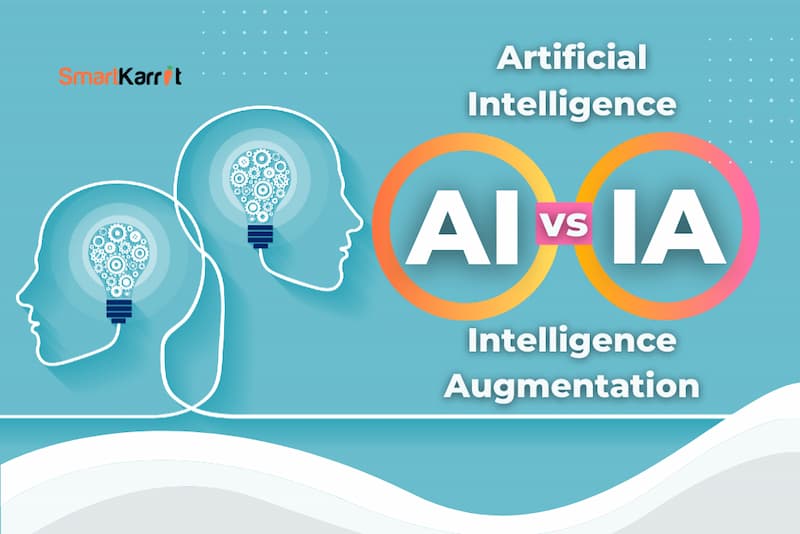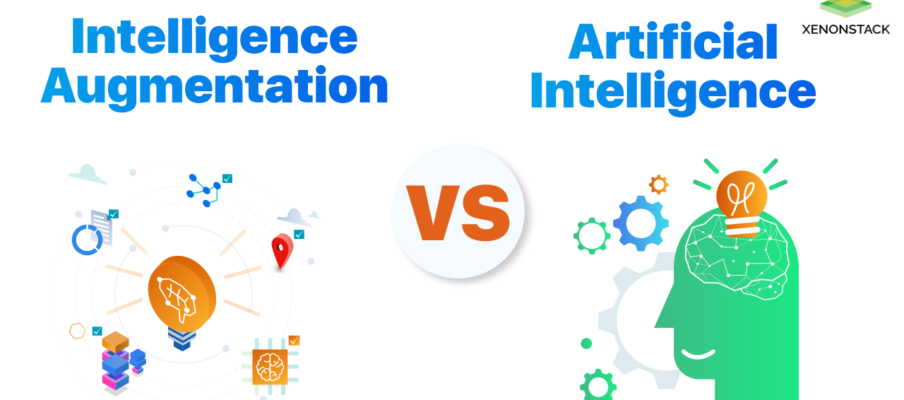From Facebook chatbots and machine learning to lights-out production lines to the rise of robotics and supply chains powered by the Internet of Things (IoT), the coming of age of ARTIFICIAL intelligence is creating a wave of excitement and fear.
However, AI cannot be considered in isolation. It’s technology, and it’s the way that technology is deployed that has the chance to really change.
So, given the difference between AI and intelligent automation, it is the concept of the latter that is truly the game-changer for businesses.
So, what are the differences Between Intelligent Automation and Artificial Intelligence?
Table of Contents
Introduction to AI and Intelligence Automation
What is Artificial Intelligence?

Artificial intelligence, or AI for short, refers to intelligence displayed by machines rather than humans. Defined focuses on work and responds in the same way humans do to improve performance. It is trained in understanding logic, problem-solving, planning, natural language, and facial recognition, as well as knowledge. Artificial intelligence, or AI for short, refers to intelligence displayed by machines rather than humans. Defined focuses on work and responds in the same way humans do to improve performance. It is trained in understanding logic, problem-solving, planning, natural language, and facial recognition, as well as knowledge.
What is Intelligence Augmentation?

Intelligence enhancement technology can help people improve their intelligence and decision-making skills. The concept of enhanced Intelligence (IA) revolves around enhancing rather than replacing human intelligence. Auxiliary intelligence, intelligent amplification, cognitive enhancement, and machine-enhanced intelligence are other names.
Artificial Intelligence vs Intelligence Augmentation

Artificial intelligence and intelligence enhancement are two buzzwords we use interchangeably. However, it explains the difference between the two. Artificial intelligence refers to the broader concept of machines that humans believe have the intelligence to perform tasks. When technology supports and complements human cognitive functions, it is called intelligence enhancement. In IA, people are at the center of systems and decisions, while technology is at the center of AI. In addition, IA systems can transcend the limits imposed by system boundaries on AI systems.
Artificial intelligence (AI), which focuses on supporting and enhancing human capabilities, is augmenting intelligence. The role of AI in enhancing human creativity can be demonstrated by intelligence enhancement. Intelligence enhancement, on the other hand, can combine the results of ai algorithms and guide humans to improve their performance.
Use Cases of Intelligent Automation
The following are the defining use cases for intelligent automation
- Human Resource Intelligent Automation (HR)
Speaking of IA, there’s nothing to worry about; In fact, hr has a huge opportunity to take advantage of the data insights that can be generated. There’s a lot of data in an organization; It’s exit feedback, performance feedback, all over the place.
With IA, the machine doesn’t make a judgment and act on it without consulting you; It just says, “Hey, look at this; I think it’s important, so you should pay attention to it.” This is the essence of scaling: improvement, not a replacement. Machines can recognize patterns and process data, making our jobs easier, employees happier and businesses are more profitable.
- Financial intelligent automation
Financial institutions are constantly looking for new ways to improve their services. In addition, Fintech solutions may be affected by government legislation or changes in customer needs.
Therefore, enhanced intelligence can evaluate and process customer data to provide better solutions. In addition, the data can help banks gain insights that will enable them to market their solutions to customers. As a result of these insights, agencies can now participate in trends. As a result, the agency will reach the right population, optimize its budget, and increase its market share.
- Medical intelligent automation
The healthcare industry is currently experiencing a surge in costs. Patients are also demanding new payment arrangements. As a result, we can provide preventive care cost-effectively.
Above all, improving patient care is critical to increasing hospital revenues. Thus, enhanced intelligence provides hospitals with options to enhance operations. It also checks important parameters such as length of stay, occupancy rates, etc. Thus, these insights help hospitals allocate resources, and develop routine operations and physician schedules, among other things.
- Intelligent automation in manufacturing
Manufacturing today faces huge obstacles. In addition, challenges such as supply chain disruptions and raw material shortages are intensifying. As a result, companies today rely on data and other cutting-edge technologies to stay competitive.
In addition, manufacturers are adapting to change by taking advantage of production trends and adapting on-demand product solutions. Manufacturing uses enhanced intelligence to inspect and evaluate critical data points, such as production lines, shipping schedules, and so on. As a result, these insights allow manufacturers to be more precise throughout their production operations.
- Intelligent automation of Retail Industry
Enhanced intelligence can help stores make better use of data in their daily operations. Therefore, data analysis helps to leverage customer trends and inventory optimization.
What are the Applications of Intelligence Augmentation?
Customer analysis supported by IA finds high risk/high lead customers: It’s not important to see customers leave. However, you can meet their needs by implementing IA in your system. They can quickly identify which consumers are rejecting and bring the situation to your attention with surprising speed.
Forecasting sales: Using AI-powered tools to collect historical data on customers’ previous purchases can help salespeople make better decisions. It will also help find the least popular and most popular products. It can also predict which products will be advertised on a particular date, increasing your revenue.
Understand data better: You can now engage and understand your customers’ data more deeply with IA-enabled solutions. Now, you can examine their previous buying patterns, determine what products and services they like and recommend their favorite products and services based on the information provided.
Conclusion
Finally, the above example of enhanced intelligence illustrates its significance for improving human productivity. Thus, the strategy enables the enterprise to build a future-oriented analysis by supporting data-driven decisions.




